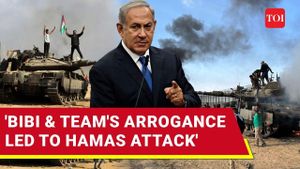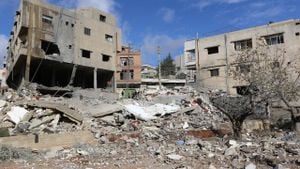International diplomacy is currently fraught with tensions, especially when it involves sensitive issues like nuclear proliferation. A recent meeting between the chief of the International Atomic Energy Agency (IAEA), Rafael Grossi, and Iran's Foreign Minister, Abbas Araghchi, highlighted these concerns. This meeting, as reported by various state media, may play a pivotal role in shaping the future of Iran's nuclear program and its relationship with the global community.
Grossi arrived in Tehran with a delegation to engage directly with Iran's top nuclear and political officials. The Iranian state news agency, IRNA, confirmed the meeting, which took place amid heightened scrutiny of Iran's nuclear activities and its potential to develop weapons-grade materials.
This visit is particularly significant as it raises questions about Iran's intentions and the broader geopolitical dynamics at play. The IAEA has been attempting to monitor Iran's compliance with agreements related to its nuclear program, which has drawn international concern, particularly from Western nations. The dialogue initiated by Grossi aims to clarify these issues, ensuring transparency and possibly averting escalation.
Iran’s nuclear program has been under the microscope since the United States withdrew from the Joint Comprehensive Plan of Action (JCPOA) back in 2018, which was meant to curb Tehran's nuclear ambitions. Since then, Iran has gradually reduced its commitments to the agreement and has been enriching uranium beyond the limits set by the JCPOA. This escalation has heightened fears about potential weapons development, leading to increasing calls from the international community for more rigorous oversight.
The backdrop to these discussions is not just diplomatic but also involves military dimensions. Iran’s capabilities and ambitions pose risks not only to regional stability but also to international peace at large. The outcome of Grossi’s meetings will likely influence Western policies and sanctions aimed at curtailing Iran’s nuclear potential.
Meanwhile, the situation is complicated by the broader U.S.-China diplomatic tensions. Upcoming talks between U.S. President Joe Biden and Chinese President Xi Jinping are expected to cover various international concerns, including North Korea’s nuclear threats and the stability of the Taiwan Strait. These discussions will inevitably intersect with how nations view Iran's position on the global stage.
With the potential return of Donald Trump to the U.S. presidency raising questions about America's future foreign policy direction, it remains uncertain how this might influence nuclear discussions with Iran or the strategic balancing acts involving China and Russia.
Back to Iran, Grossi's visit might also be seen as part of IAEA’s broader strategy to engage with all nuclear powers and to address non-proliferation comprehensively. The stakes are high; managing nuclear risks is not merely about enforcing boundaries but also about building trust among nations, particularly those with contentious histories.
For Iran, Grossi's mission is also about reinstatement. Following years of sanctions and isolation, the country is increasingly eager to engage genuinely with the international community, albeit on its terms. Should the discussions lead to constructive agreements or understandings, they might pave the way for Iran's gradual reintegration and for lifting some economic sanctions, responding to Tehran's long-suffered hardships.
Yet, any deal must satisfy the stringent demands of other signatories of the JCPOA, particularly European countries who share concerns over proliferation but also respect Iran’s sovereignty. The balancing act is delicate — appeasing multiple parties whose interests often conflict.
Meanwhile, as diplomatic maneuvers continue, on-the-ground realities remain stark. Iran's capacity to enrich uranium at levels close to what is necessary for weaponization presents old fears anew—nuclear arms races are not just relics of the past, and the threat of nuclear proliferation is as potent as ever.
Grossi's engagement with Tehran can be seen as part of the international community's response to these risks. His role is pivotal; he must navigate Iran's ambition delicately, ensuring compliance without provoking undue aggression.
For the world, this meeting signifies more than just bilateral talks; it is emblematic of the tightrope walk international diplomacy must perform to prevent the darkest consequences of nuclear proliferation. The coming days will reveal whether this meeting yields any substantial agreements or merely feet-dragging posturing typical of high-stakes diplomatic negotiations.



